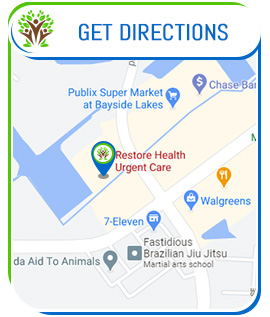Monkeypox Treatment Clinic in Palm Bay, FL
Monkeypox treatment focuses on relieving symptoms and preventing the spread of the virus. At Restore Health Urgent Care, our experienced healthcare team provides effective care for individuals affected by monkeypox. If you suspect you have monkeypox or have been in contact with someone who has, it’s essential to seek timely treatment. For more information, contact us today or visit us online to book an appointment. We are conveniently located at 1840 Eldron Blvd SE. Suite 1 Palm Bay, FL 32909.
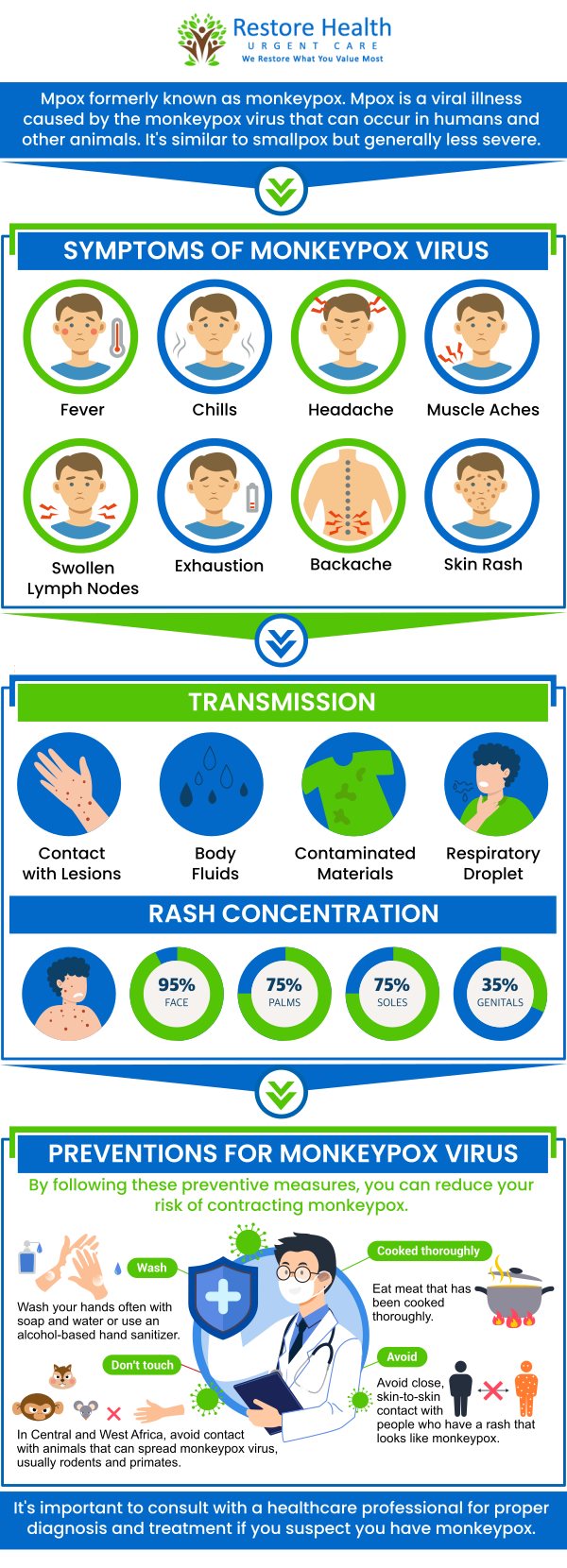
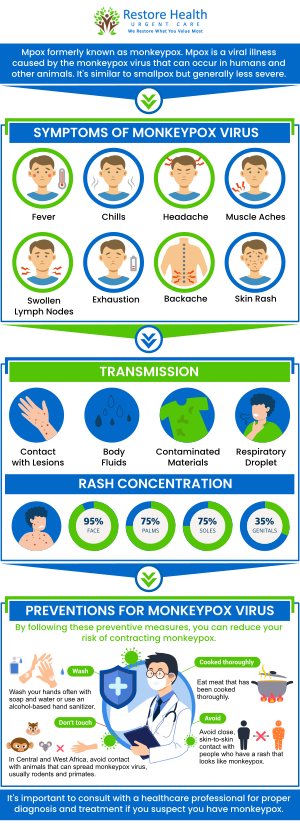
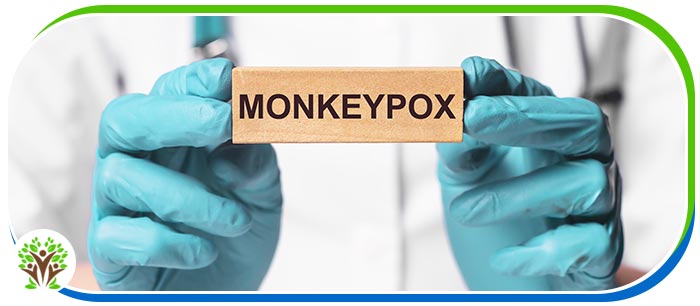
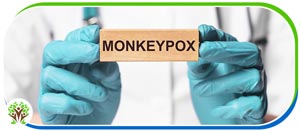
Table of Contents:
What is monkeypox?
What are the symptoms of monkeypox?
What causes monkeypox?
How does monkeypox spread?
Monkeypox is a rare but important viral illness caused by the monkeypox virus, which is related to the smallpox virus. While it is generally less severe than smallpox, monkeypox can still cause significant symptoms and concerns for individuals and communities.
How Monkeypox Spreads
Monkeypox is considered a zoonotic disease, meaning it can spread from animals to humans, as well as from person to person. Most cases have historically occurred in Central and West Africa, but recent outbreaks have been seen in other parts of the world, including the United States. The virus can be transmitted through:
Direct contact with the blood, bodily fluids, or skin lesions of infected animals (such as rodents or primates)
Close contact with an infected person, especially through respiratory droplets, skin lesions, or contaminated materials like bedding or clothing
What to Do If You’re Concerned
At Restore Health Urgent Care, your health and safety are our top priorities. If you develop symptoms consistent with monkeypox—especially if you’ve had contact with a confirmed case or traveled to an area with known cases—please contact us right away.
Our experienced medical team can:
• Assess your symptoms and risk factors
• Provide testing, if indicated
• Guide you on self-care, isolation, and when to seek further treatment
• Coordinate with local public health authorities as needed
Prevention and Treatment
• To reduce the risk of monkeypox, we recommend:
• Practicing good hand hygiene
• Avoiding close contact with individuals who are ill or have unexplained rashes
• Using personal protective equipment when caring for someone with suspected monkeypox
• Staying up-to-date on available vaccines (smallpox vaccines may offer protection in some cases)
While most cases resolve on their own, antiviral medications may be recommended for severe cases. Our team is prepared to help you navigate any concerns about monkeypox and other infectious diseases.
At Restore Health Urgent Care, we’re committed to helping you recognize and manage emerging health concerns like monkeypox. Monkeypox often starts with symptoms that can be easily mistaken for other viral illnesses, making early evaluation important. If you develop a sudden fever, chills, headache, muscle aches, back pain, or extreme fatigue, it’s important to seek prompt medical attention, especially if you also notice swollen lymph nodes, which is a key sign that distinguishes monkeypox from similar conditions.
Within one to three days after the fever begins, a rash may appear, usually starting on the face and spreading to other areas, including the palms of the hands and soles of the feet. This rash progresses through several stages: flat red spots, raised bumps, fluid-filled blisters, and then pus-filled lesions that eventually crust and fall off. The number and spread of these lesions can vary from person to person.
Monkeypox typically resolves within two to four weeks, and most people recover fully. However, severe illness can occur, particularly in those with weakened immune systems or underlying health conditions. If you or a loved one develops any of these symptoms, visit Restore Health Urgent Care for a thorough evaluation, testing, and supportive care. Early diagnosis can help manage symptoms and prevent the spread of infection to others.
Monkeypox is a rare but potentially serious disease caused by the monkeypox virus, which is related to the virus that causes smallpox. While monkeypox is generally less severe, it is important to recognize the symptoms and understand how it spreads.
How Monkeypox Spreads Monkeypox is most commonly found in certain regions of Central and West Africa, where it is believed to be transmitted from animals such as rodents and primates. However, cases can occur elsewhere, and human-to-human transmission, while less common, is possible. The virus can spread through:
• Direct contact with the blood, bodily fluids, or skin lesions of infected animals
• Consumption of undercooked meat from infected animals
• Close contact with an infected person, particularly through respiratory droplets, skin lesions, or contaminated materials (such as bedding or clothing)
• Prolonged face-to-face contact
Anyone can contract monkeypox, but people with weakened immune systems or those who have close contact with infected individuals may be at higher risk.
If you are experiencing symptoms such as fever, rash, swollen lymph nodes, or have been in contact with someone diagnosed with monkeypox, it’s important to seek medical attention promptly.
At Restore Health Urgent Care, our experienced team is here to evaluate your symptoms, provide testing if necessary, and guide you with the latest recommendations for treatment and isolation.
At Restore Health Urgent Care, we want our community to stay informed about emerging health concerns, such as monkeypox. Monkeypox spreads primarily through close contact with an infected person or animal. The virus can enter the body through broken skin, the respiratory tract, or mucous membranes like the eyes, nose, or mouth.
Human-to-human transmission often occurs through direct contact with the lesions, bodily fluids, or respiratory droplets of someone who is infected. This can happen during prolonged face-to-face interactions, such as living with or caring for an infected individual. Monkeypox can also be transmitted by touching objects, fabrics, or surfaces—such as bedding, clothing, or towels—that have been contaminated by an infected person.
Although monkeypox is less contagious than illnesses like measles or COVID-19, taking precautions to avoid close contact with infected individuals and contaminated materials is essential. If you think you may have been exposed to monkeypox or are experiencing symptoms such as fever, rash, or swollen lymph nodes, we are here to help.
Our medical team can evaluate your symptoms, provide testing if appropriate, and guide you on the next steps for care and isolation to help protect you and those around you. To talk with a member of our specialist team, contact us or book an appointment online. We are conveniently located at 1840 Eldron Bivd SE. Suite 1 Palm Bay, FL 32909. We serve patients from Palm Bay FL, Melbourne FL, Malabar FL, June Park FL, Grant-Valkaria FL, and surrounding areas. Walk-ins Welcome.
Additional Services You May Need


